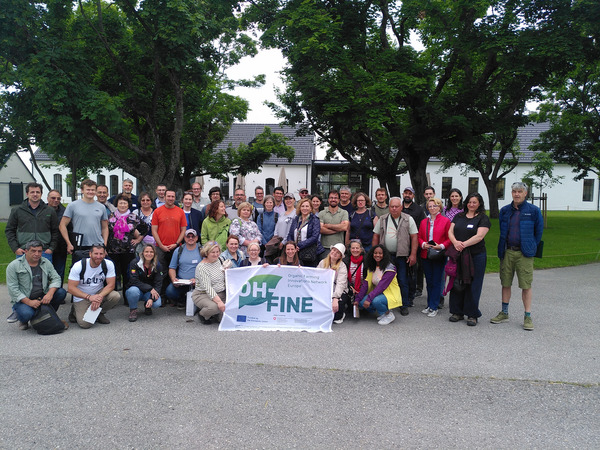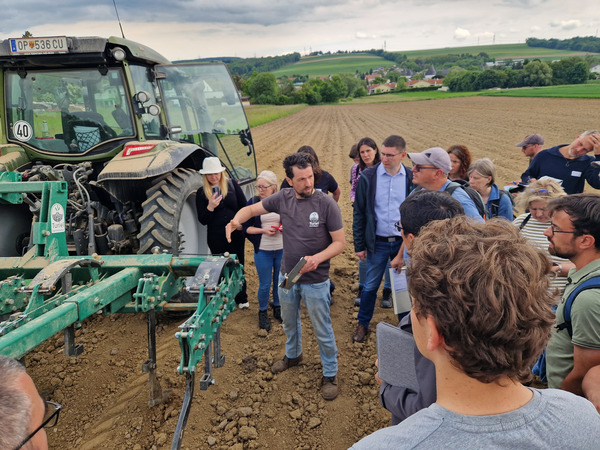The aim of the OH-FINE project is to create a European network where farmers can share experiences and knowledge, as well as establish new contacts. The project focuses on the challenges of converting to organic farming, as well as on developing innovative cultivation and marketing methods for the post-conversion phase. As part of the project, a total of eight cross visits are planned. The trip to Vienna marked the start of the cross visits. The 48 participants from nine European countries visited various organic farms in Austria to learn about innovative cultivation systems and techniques.
Gain insights into organic farming in Austria
Organic farming has a long history in Austria, dating back to around 1930 when the first organic farm was established. In recent decades, the industry has experienced significant growth, particularly since joining the EU. Currently, around 23 per cent of farms are certified as organic. Most of these products are sold through retail stores.
As part of the exchange of experiences, four organic farms were visited: two in Lower Austria and two in Burgenland.
On the first day of the trip, we travelled to Lower Austria. One of the farms visited was Biohof Adamah, which is renowned for its 'Bio-Kistln' (organic produce boxes). To deliver over 6,000 'Bio-Kistln' every week, the family business works with regional and national farmers. Their range of 100% organic products includes fresh fruit and vegetables, dairy products, meat and natural cosmetics.
Another stop was the Ripfl organic farm, a family business that takes an innovative approach to farming, incorporating techniques such as agroforestry and strip cropping. The farm combines almond cultivation with other crops to optimise its use of resources.
During discussions with farmers from Austria and Spain, differences were highlighted, and possible future scenarios were explored. In Lower Austria and Burgenland, for example, farmers can irrigate their fields with groundwater from a depth of four to six metres. A Spanish farmer, on the other hand, reported: "To irrigate my fields, I pump groundwater from 200 metres down."
On the second day, the tour continued to Burgenland. Climate change is also evident here, prompting intense discussions among participants about adaptation strategies. One impressive example is the Esterhazy organic estate, which runs a 5,600-hectare organic farm. The estate's sustainable approach is reflected in its closed nutrient cycles and increased use of livestock. As well as arable farming, the estate processes and sells its own products in a restaurant, butcher's shop and farm shop.
Ridge cultivation and adapting seeds on the farm
The Binder-Laki organic farm is a family business located in Central Burgenland. Wolfgang Binder-Laki and his family cultivate 55 hectares of arable land, 2.5 hectares of grassland, and one hectare of forest. The farm has been certified organic since 1992.
He relies on ridge cultivation and grows rapeseed, wheat, rye, spelt, oats, soybeans and legumes as part of a structured crop rotation system. Using only two agricultural machines, he works in a resource-efficient manner and propagates his own seeds to help them adapt to the local climate. Ridge cultivation originated in Spain, where it is widely practised.
This cultivation technique is mainly known in neighbouring countries for potato and carrot farming. According to Wolfgang, ridge cultivation has many advantages, such as ensuring good air circulation and creating a favourable microclimate. It also enables effective water storage. Wolfgang explained that the ridges shade the soil during hot periods while warming it more quickly in spring.
The cross visit provided a fascinating insight into organic farming in Austria, giving participants from nine European countries the opportunity to network and learn from each other. We are looking forward to the next opportunity to gain insights into organic farming in our partner countries. The next cross visit will take place in Spain in October 2025. European farmers are warmly invited to participate, learn about various organic farming practices and ideas from across Europe, and share their own experiences.
Barbara Schäfer, FiBL CH




 tap and then scroll down to the Add to Home Screen command.
tap and then scroll down to the Add to Home Screen command.